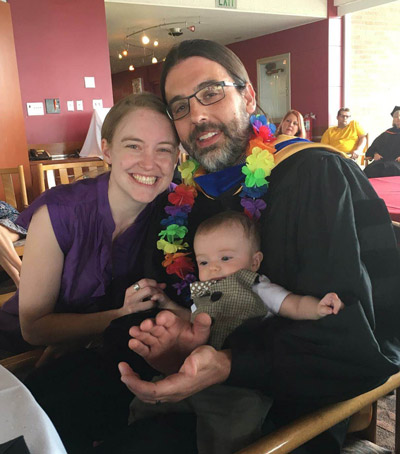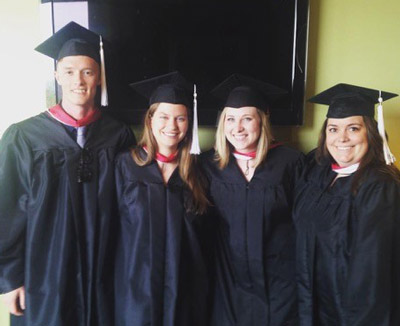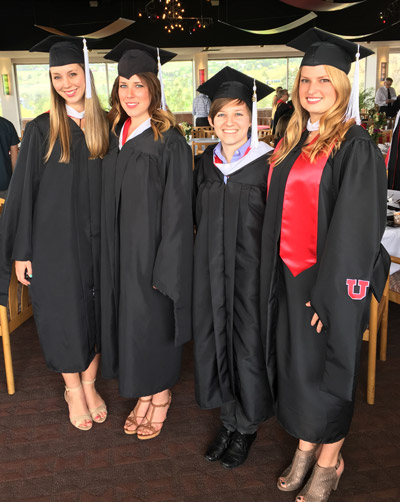Brian Baucom Delivered an Inspirational Graduation Speech (May 2016)
 |
|
Brian Baucom,his wife Katie Baucom and their son Jackson |
Thank you very much. It’s a real honor to be up here this morning. Ever since Tammy let me know that I would have the chance to do this, I’ve been spending a lot of time thinking about what I wanted to say to you. Part of that is probably because I’m a first time dad of a four month old and thinking clearly isn’t really something I do right now, but I think the main thing is that I had a tough time figuring out how to decide what I wanted to say.
My first thought was that maybe I could say what I wish someone had told me when I was where you are now. It wasn’t all that long ago that I got my doctorate, but something about that didn’t seem quite right. My second thought was that maybe I could figure out the one thing that I wish that I had had the chance to teach you all before you graduated. But that didn’t seem right either. Today is about celebrating you and not about one last chance to give you a lecture. My last thought was that maybe I could tell you what I wish someone would say to my boy if he was sitting in your seat 20 some odd years from now. No pressure, Jack. You can be anything you want to be when you grow up. We’ll talk more about that later when you have language comprehension when you’re older. That way of thinking about it felt right to me so here goes…
We are so incredibly proud of you for all that you have learned, all that you’ve achieved, and all the ways that you’ve grown. You’ve used complex methodologies, bleeding edge technologies, and sophisticated statistics to do remarkable research. You’ve learned how to care for the wounded and afflicted – how to determine why someone is suffering and what can be done to improve their quality of life. And you’ve begun to learn how to navigate the tricky and at times treacherous waters of science and academia.
It’s this last point that I want to say more about – how and why we do what we do - because I think it’s arguably the hardest and most challenging but also potentially the most rewarding part of what it is that we all do. By virtue of being here this morning, you’ve all demonstrated that you have mastery of the skills needed to be a psychologist. My main hope for all of you is that by acquiring and honing these skills, you’ll have the opportunity to have a career that you value, that you will find rewarding, and that will repay you in kind for all of the blood, sweat and tears that I know you’ll invest.
As you begin the next phase of your career, one thing that I desperately hope that you will keep in mind is that our profession, being a psychologist in whatever form that may take, is something that demands the highest levels of personal and professional integrity, authenticity, wisdom and humility. These qualities, integrity, authenticity, wisdom, and humility, may not help you write more papers, get more grants funded, or get elected to prestigious professional organizations, but they will help you do all of those very important things in a way that I think you will feel good about and that I know we will all feel good about.
In saying this, I want to acknowledge that this is setting the bar awfully high for you. What I’m saying at its most basic is that I hope you will not be satisfied to fill your CVs with publications in high impact journals, to receive significant extramural funding from government agencies or private foundations, to wisely counsel consulting clients, to skillfully provide psychotherapy for individuals with complex and highly comorbid presentations, or to figure which programs are most effective and why for public and private agencies. What I hope is that you will all be mindful of how you accomplish these great things and all of the contributions, sacrifices, and investments that you and your team, in whatever forms that takes, make together to achieve these ends that you need for your careers and that society needs to improve the human condition.
I think the reason that finding a way to integrate these qualities into your professional life seems so important and vital to me is that it has been so amazingly striking when I’ve come across examples of that happening in my own life. Two of these involve psychologists and the third is an academic administrator so kind of close enough.
 |
|
From Left to Right: Alexander Crenshaw, Madison Neirmeyer, |
The first example that involves psychologists is one that has overlaps with my own family life. My dad is a psychologist, actually one who studies couples which is what I do too, apple – tree. One of the things that has been really special about doing the same thing as my dad is that I have gotten to see a part of his life that I didn’t know all that much about before we started going to the same conferences and running in similar professional circles. As that’s happened, one of the things that I’ve pieced together is that some of my dad’s best friends are the very same people who could have been his biggest sources of professional competition for his entire career. He and a group of five other psychologists who also study couples and who have all been trying to come up with the most effect couple-based intervention since the start of their careers, have been really close friends for the past thirty years. They travel together before and after conferences, they know each other’s spouses and children, and they compete against each other for grants. I think the only possible way that they’ve been able to do this is that they’ve all treated each other fairly and graciously, been authentic with one another in their personal and professional lives, and expressed differences of opinion and perspective with humility and integrity. I know that it has been difficult for them to pull this off at times but I think they, and their work, are all the better for it.
The second example is something that came out of my advisor’s retirement party this past year at our big annual conference. As an aside, let me warn you that it is a very strange and mixed thing to go to your advisor’s retirement party. You know that you want to retire someday, but the idea that your advisor might also want to retire just seems wrong. You will all face this someday, and for some of you not so long from now, so be ready. Anyhow, the story that I wanted to tell is that there were a bunch of people who stood up to toast my advisor at his retirement party and one of the things that one of them said is, “… one of the reasons I respect Andy most is that he never once went beyond his data.” I have to admit that when I first heard that, I thought, “Man, what a strange thing to say. You’ve known this guy for decades and the thing you want to appreciate about him at his retirement is that he didn’t go beyond what his data could support in his discussion sections?” The comment really stuck with me and I kept rolling it around in my head trying to figure out what in the world this person was trying to say. And I think that I finally figured it out. What I think he was trying to say is that out of all of the impressive things that Andy did in his career, and there were many, the thing that stood out to this other very prestigious scholar was the scientific integrity, and perhaps even humility, with which Andy did them.
 |
|
From Left to Right: Rachael Hopman, Erika Roberge, Leigh Spivey and Kelly Funkhouser |
The last example is one that has stuck with me since childhood. I was raised Methodist and had to go to church every weekend whether I had any interest in doing that or not. I’m not actively religious now and there were many Sundays when I was young when I’d have rather been anywhere but in a hard wooden pew. I spent a lot of time playing dots on the back of a tithing envelope with my sisters but it turns out that I might have been listening to at least some of what was being said even though I was trying not to. When I was working on this talk, I had this vague memory of a sermon about a CEO of some big corporation who knew the names of his janitorial staff and stopped to talk with them in the halls. I couldn’t really remember the details and thought that it was probably just one of those allegorical stories that get told to teach you about humility and all that. On a whim, I mentioned it to my mom and she helped me figure out that it was actually a story about a man named William Friday. That name is probably not familiar to many of you but if you were from North Carolina, it probably would be. William Friday was president of the 17-campus University of North Carolina system for thirty years, from 1956 to 1986. As impressive as it is to hold a position like that for 30 years, when he was memorialized in the local paper after his death in 2012, he was remembered much more for the kind of person he was than for the great things he did. The article about him included quotes from a parking lot attendant, a barber, a local butcher, a former athletic director, a former mayor, and multiple former governors, all of whom knew him personally and all of whom universally appreciate his kindness, wisdom, humility, and integrity. My mom also told me a story about seeing him stop to help the family of a very lost high school student find their way around the main campus of UNC-Chapel Hill in the sweltering heat of summer.
So all of that’s to say that we want you to go out and achieve and do great things, make important discoveries, and push our field ahead in ways that we could never imagine ourselves. My charge to you is to please put just as much thought into how you make these important advancements as you do into designing the studies, selecting your assessment battery, delivering psychological interventions, framing your feedback to consulting clients, and writing your papers and grants. My hope is that you, and we, will be all the better for it.
